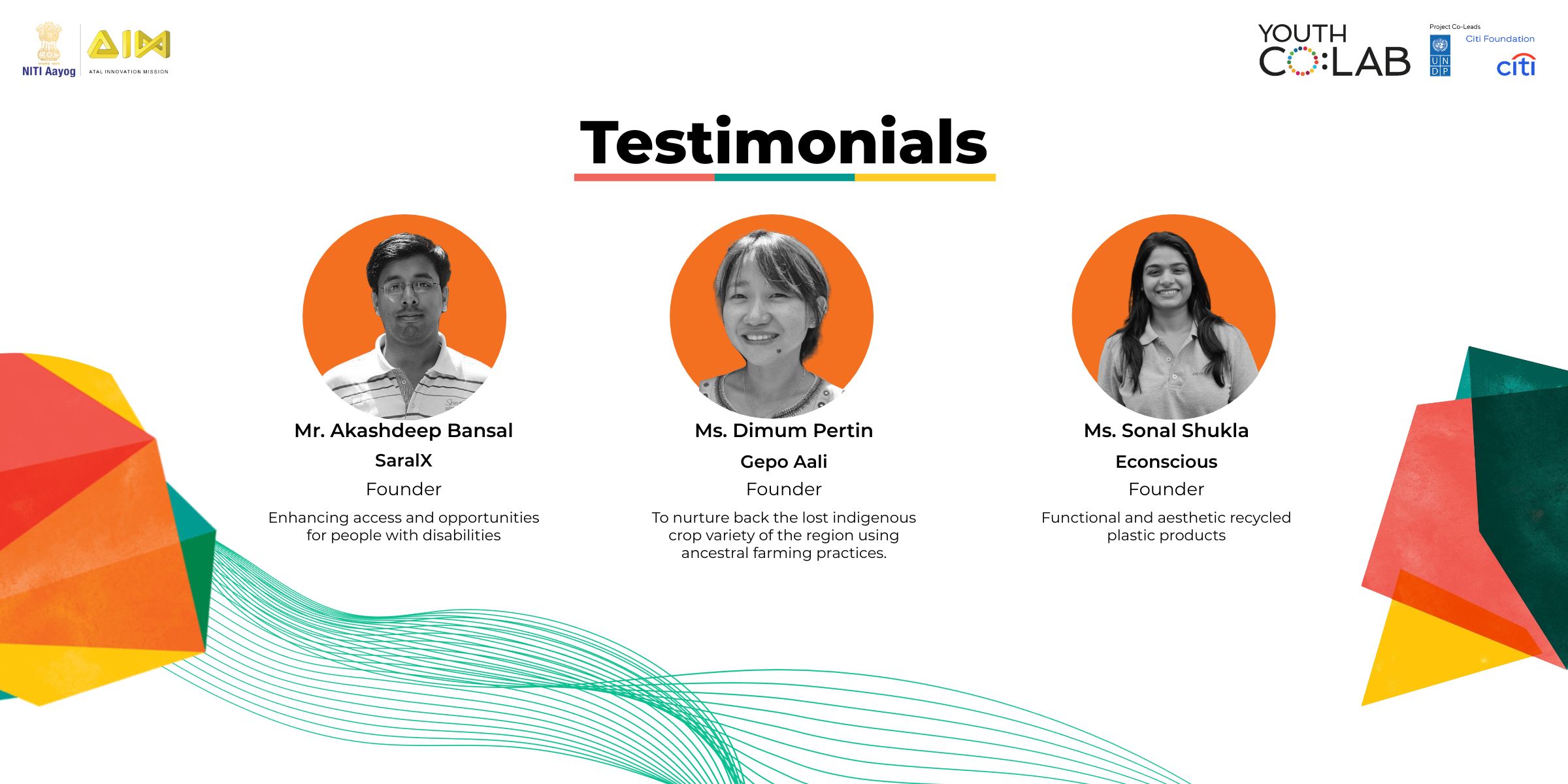
Co-created in 2017 by the United Nations Development Programme (UNDP) and Citi Foundation, Youth Co:Lab aims to establish a common agenda for countries in the Asia-Pacific region to empower and invest in youth, so that they can accelerate the implementation of the Sustainable Development Goals (SDGs) through leadership, social innovation and entrepreneurship. Learn more at www.youthcolab.org.
In India, Youth Co: Lab was launched in 2019 in collaboration with Atal Innovation Mission, NITI Aayog. Through this collaboration Youth Co: Lab has conducted five national theme-specific youth social innovation and entrepreneurship challenges in India, including several forms of engagement such as panel discussions, workshops, dialogues, and webinars. Youth Co: Lab in India and regionally also supports social entrepreneurs through a long-term incubation programme, with selected entrepreneurs representing India at the regional summit.
The sixth edition of Youth Co:Lab India will focus on identifying and supporting youth-led early-stage social enterprises or innovations working in the domains of:
Eligibility criteria to participate in Youth Co:Lab 2023-24:
If you have any further queries about Youth Co:Lab India 2023-24, we recommend you to visit our FAQs Section.
For this year’s Youth Co:Lab season the focus would be on youth innovation and entrepreneurship addressing the following problems:
In tackling the challenges of credit and insurance accessibility for farmers, the strategic approach is centered on innovative solutions, aiming to surmount existing hurdles and foster a positive transformation in income generation and long-term resilience. Within this progressive paradigm, the critical role of Agriculture Fintech and Insurtech is acknowledged in reshaping the dynamics for small and marginal farmers. The commitment transcends conventional boundaries, seeking to provide these farmers not only with essential financial tools but also with inventive insurance structures that enhance accessibility and adaptability.
This approach not only makes credit more readily available but also tailors insurance solutions to align with the unique needs of farmers. The integration of digital technologies underscores the commitment to efficiency and effectiveness in delivering these services. Through the combined strengths of Fintech and Insurtech, our vision is to actualize economic empowerment, creating a sustainable trajectory for significant income growth and fortified resilience among small and marginal farmers. In this ongoing journey of innovation and strategic collaboration, we strive to shape a landscape that not only addresses the immediate needs of farmers but also positions them for sustained prosperity in the ever-evolving agricultural ecosystem.
Addressing the multifaceted challenges confronted by tribal and indigenous groups requires innovative solutions that go beyond conventional approaches. These communities often grapple with limited access to essential resources, basic services, healthcare facilities, and income generation opportunities. To improve their overall well-being, it is crucial to explore creative and forward-thinking initiatives.
This involves leveraging technology, devising community-driven strategies, and implementing novel business models. Innovative solutions could encompass educational interventions, sustainable agricultural practices, improved healthcare infrastructure, and tailored economic opportunities. The goal is to empower these communities by respecting their unique cultural identities while addressing their specific needs. By embracing inventive approaches, we can contribute to the development and resilience of tribal and indigenous groups, fostering inclusivity and sustainable progress.
Assistive technology encompasses a wide array of services and products dedicated to fostering independence and well-being. Beyond the mentioned devices like hearing aids, vision aids, wheelchairs, communication aids, spectacles, prostheses, pill organizers, and memory-related software and hardware solutions, this transformative field continually evolves to address diverse needs. Innovations such as smart home systems, wearable technologies, and personalized apps further contribute to enhancing daily life for individuals with varying abilities. By leveraging cutting-edge advancements, assistive technology endeavors to break down barriers, empower individuals, and create an inclusive environment where everyone can thrive with dignity and autonomy.
The ongoing commitment to research and development in this field ensures that emerging technologies will continue to redefine what is possible, opening new horizons for accessibility and well-being.
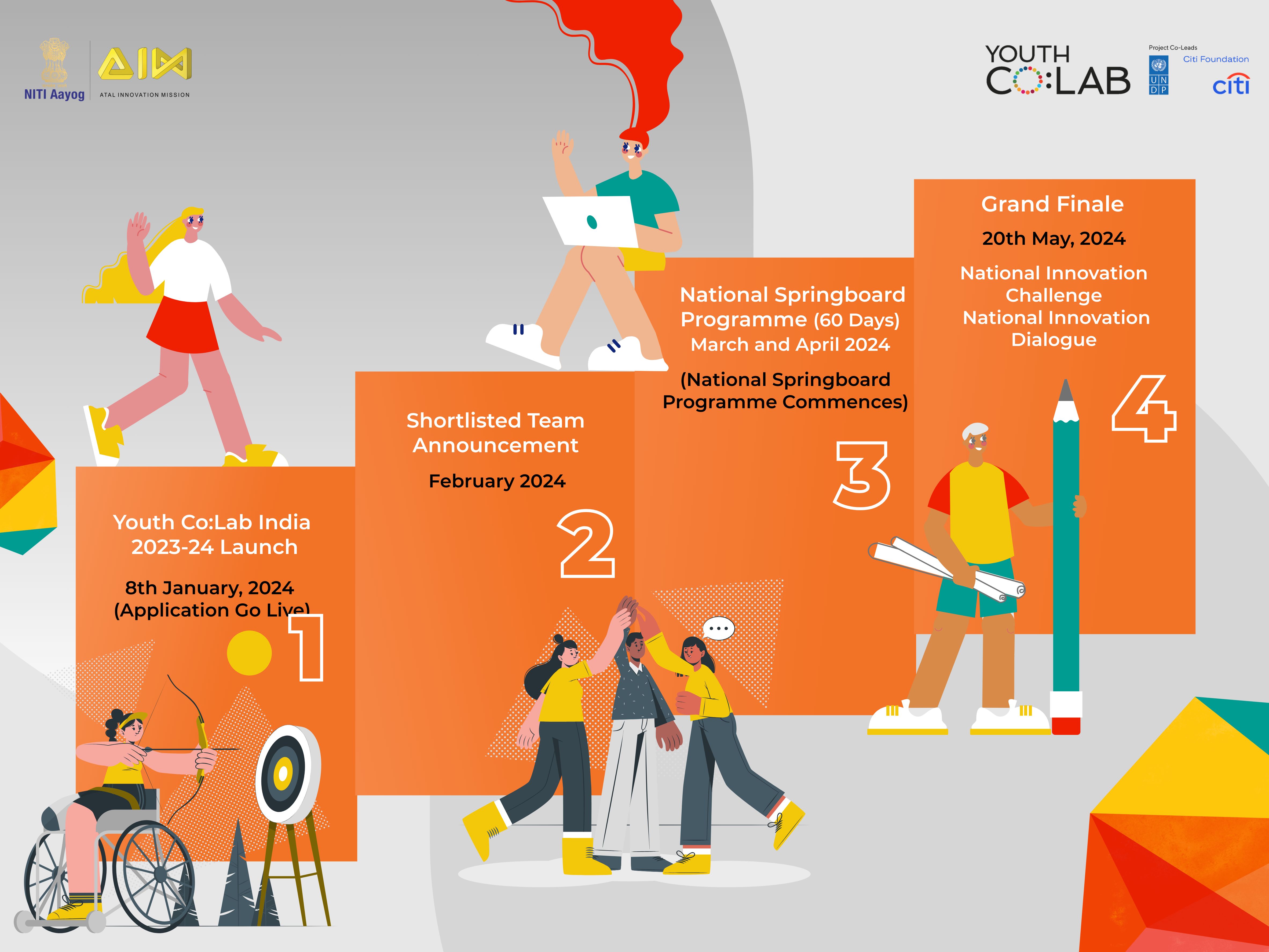
Youth Co:Lab, co-created in 2017 by UNDP Asia and the Pacific and Citi Foundation is a multi-dimensional and multi-level response to tackle the challenges young people face by positioning youth front and center to find solutions to today’s most pressing problems. Youth Co:Lab was launched in India in 2019 by UNDP and Atal Innovation Mission. The focus of the portfolio has been primarily on women and youth from marginalized communities across the country. It takes into consideration that women face significant social and economic barriers in participating in India’s workforce.
The top 20 teams will be identified. In preparation for the National Innovation Challenge and Dialogue (NIC and NID), a National Springboard programme will be conducted to better aid the teams with their business models. The top 6 teams will be selected from (NIC and NID) for the Regional Springboard Programme.
Shortlisted teams will go through the National Springboard programme consisting of mentor connect, curricula support, networking opportunities, and corporate support. Sessions and modules shall include design thinking, business models, impact measurement, leadership coaching, fundraising, storytelling, presentation, pitching, etc.
The best solutions will be showcased in the National Innovation Dialogue which brings together stakeholders to establish a common agenda through capacity development, strengthening the coalition, and creating an enabling ecosystem in a national context.
The top 2 teams will also have the opportunity to represent India at the Asia-Pacific Regional Summit to present in front of leading investors and corporate partners.
Youth Co:Lab 2022-23 focused on youth-led early-stage social enterprises or innovations working in the domains of Agriculture Fintech and Insurtech for small and marginal farmers, Innovative solutions for indigenous groups, tribal communities and Assistive technology and solutions.
Atal Innovation Mission is a flagship initiative set up by the National Institution for Transforming India (NITI) Aayog to promote innovation and entrepreneurship in the country. Its objective is to create a facilitating environment for the transformation of ideas into innovative and impactful solutions at schools, universities, research institutions, MSMEs, and industry levels across the country.
Please visit Atal Innovation Mission
Follow Atal Innovation Mission on Twitter, Facebook and LinkedIn.
UNDP works across 170 countries and territories to eradicate poverty while protecting the planet. We help countries develop strong policies, skills, partnerships, and institutions so they can sustain their progress.
UNDP has worked in India since 1951 in almost all arexas of human development, from systems strengthening to inclusive growth and sustainable livelihoods, as well as sustainable energy, environment, and resilience. UNDP’s programme continues to integrate a global vision for catalytic change with India’s national priorities. With over 30 projects on the ground in almost every state, today, it works to achieve Sustainable Development Goals by transforming traditional models to do development differently.
Please visit United Nations Development Programme
Follow UNDP India on Twitter,Facebook, Instagram, and LinkedIn.
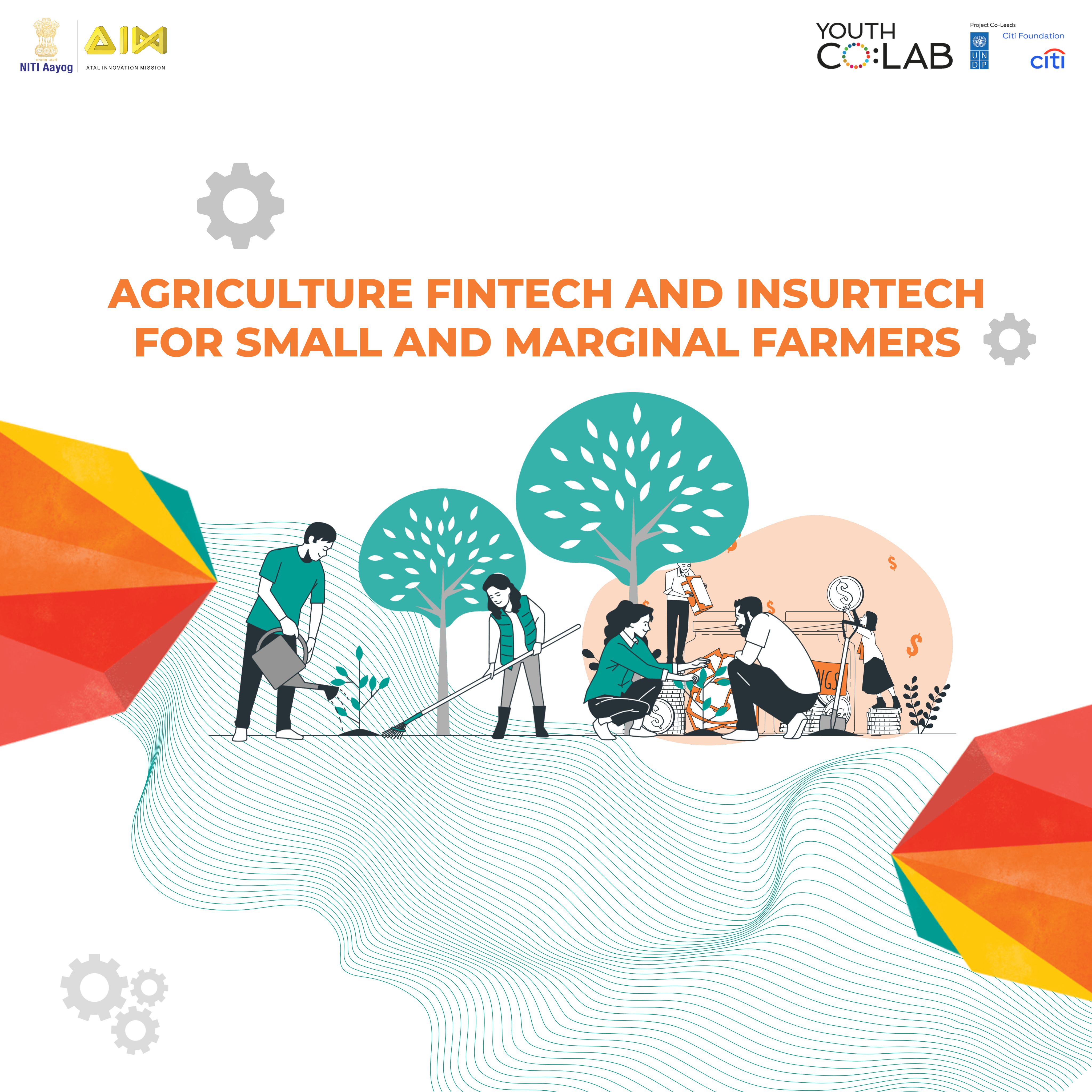
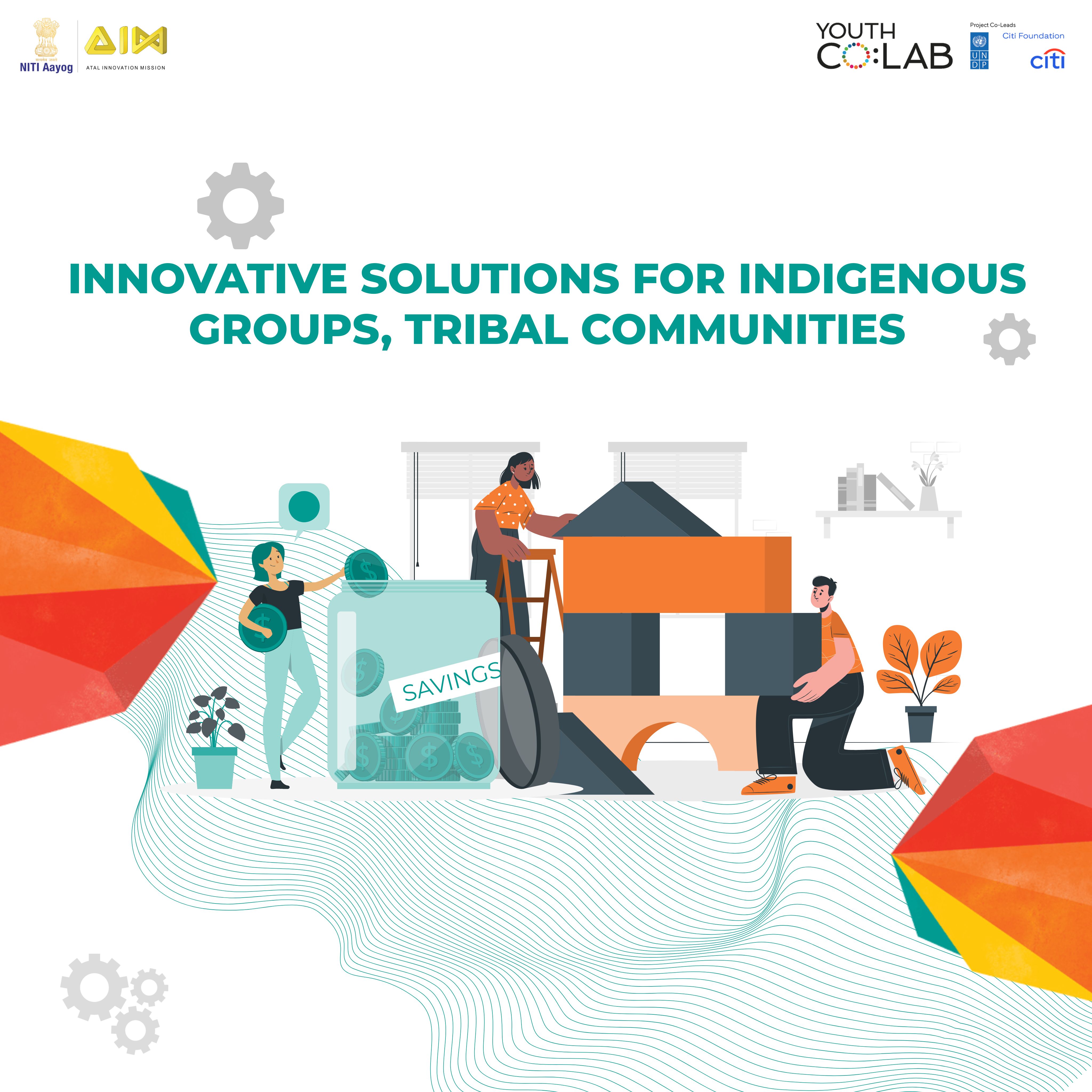
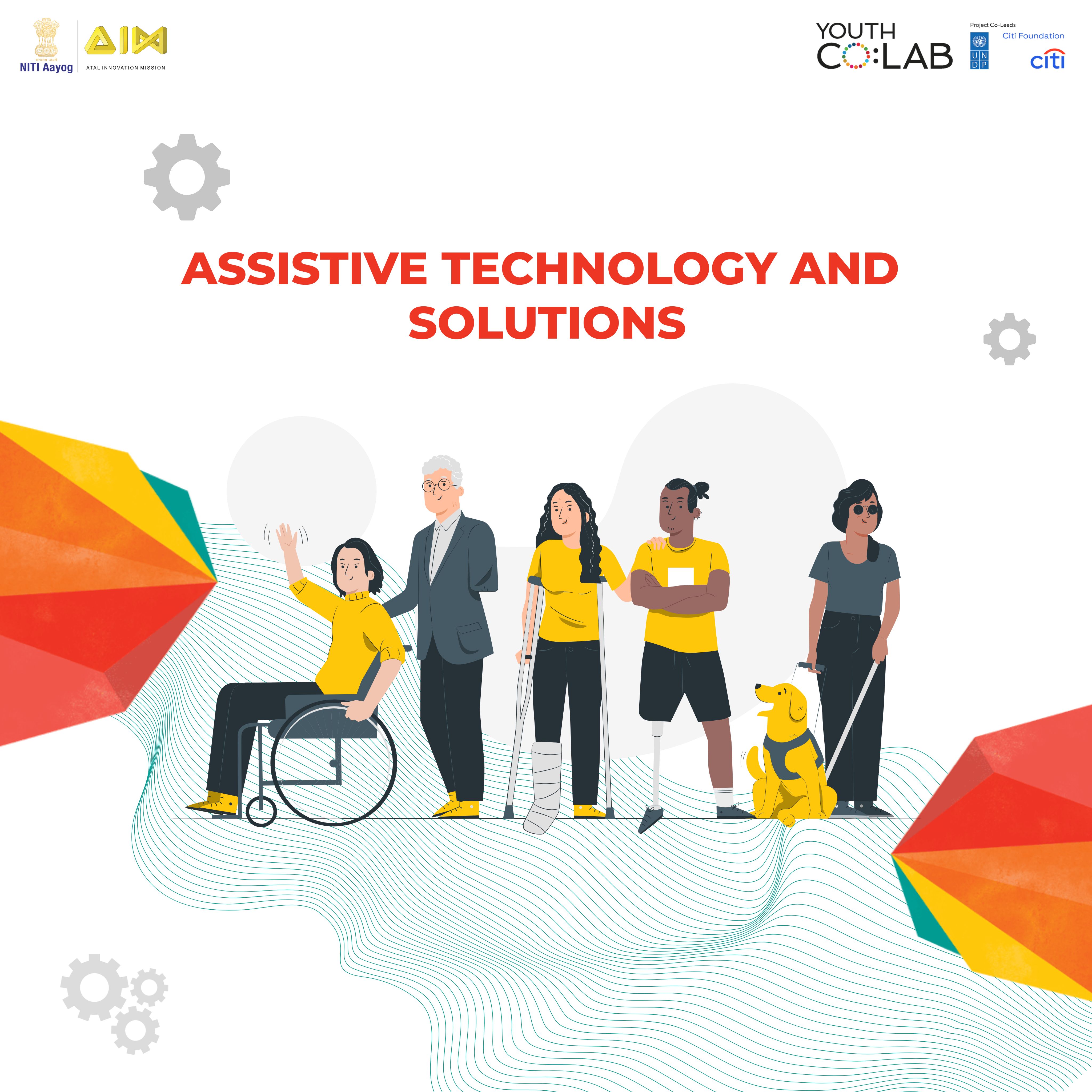
JOIN US if you are a young company or innovator working in one of the following fields!
In tackling the challenges of credit and insurance accessibility for farmers, the strategic approach is centered on innovative solutions, aiming to surmount existing hurdles and foster a positive transformation in income generation and long-term resilience. Within this progressive paradigm, the critical role of Agriculture Fintech and Insurtech is acknowledged in reshaping the dynamics for small and marginal farmers. The commitment transcends conventional boundaries, seeking to provide these farmers not only with essential financial tools but also with inventive insurance structures that enhance accessibility and adaptability.
This approach not only makes credit more readily available but also tailors insurance solutions to align with the unique needs of farmers. The integration of digital technologies underscores the commitment to efficiency and effectiveness in delivering these services. Through the combined strengths of Fintech and Insurtech, our vision is to actualize economic empowerment, creating a sustainable trajectory for significant income growth and fortified resilience among small and marginal farmers. In this ongoing journey of innovation and strategic collaboration, we strive to shape a landscape that not only addresses the immediate needs of farmers but also positions them for sustained prosperity in the ever-evolving agricultural ecosystem.
Addressing the multifaceted challenges confronted by tribal and indigenous groups requires innovative solutions that go beyond conventional approaches. These communities often grapple with limited access to essential resources, basic services, healthcare facilities, and income generation opportunities. To improve their overall well-being, it is crucial to explore creative and forward-thinking initiatives.
This involves leveraging technology, devising community-driven strategies, and implementing novel business models. Innovative solutions could encompass educational interventions, sustainable agricultural practices, improved healthcare infrastructure, and tailored economic opportunities. The goal is to empower these communities by respecting their unique cultural identities while addressing their specific needs. By embracing inventive approaches, we can contribute to the development and resilience of tribal and indigenous groups, fostering inclusivity and sustainable progress.
Assistive technology encompasses a wide array of services and products dedicated to fostering independence and well-being. Beyond the mentioned devices like hearing aids, vision aids, wheelchairs, communication aids, spectacles, prostheses, pill organizers, and memory-related software and hardware solutions, this transformative field continually evolves to address diverse needs. Innovations such as smart home systems, wearable technologies, and personalized apps further contribute to enhancing daily life for individuals with varying abilities. By leveraging cutting-edge advancements, assistive technology endeavors to break down barriers, empower individuals, and create an inclusive environment where everyone can thrive with dignity and autonomy.
The ongoing commitment to research and development in this field ensures that emerging technologies will continue to redefine what is possible, opening new horizons for accessibility and well-being.
